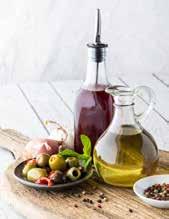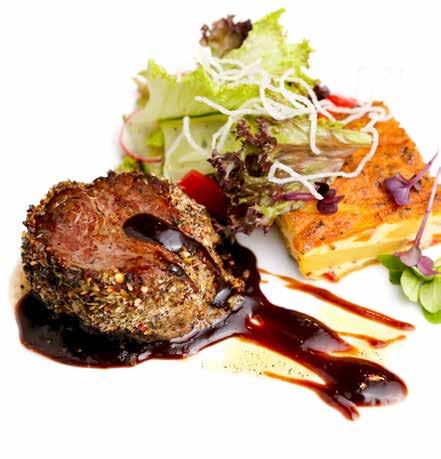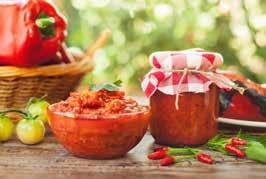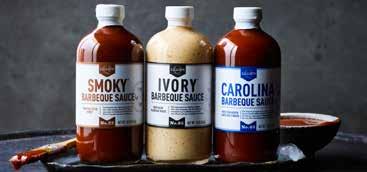
It’s worth noting that studies show most consumers don’t understand diferences in the meanings of such label claims. Te USDA recently noted, for example, that (Continued on page 2) The bi-monthly newsletter for importers of U.S. foods


It’s worth noting that studies show most consumers don’t understand diferences in the meanings of such label claims. Te USDA recently noted, for example, that (Continued on page 2) The bi-monthly newsletter for importers of U.S. foods

Consumers from all corners of the globe are stressing both their personal health and that of the planet when purchasing food and beverages. Tose factors are creating U.S. export opportunities in the natural, specialty, and gourmet food categories.
“Today’s consumers are increasingly prioritizing their health and well-being, leading to a higher demand for better-for-you food options both at home and when dining out,” said Ryan Black, CEO of SAMBAZON, a company that makes and sells açaí-based products. “Consumers are looking for key attributes such as high antioxidant content; natural, organic, or local ingredients; and immunity-boosting properties. Tey’re also focused on reducing sugar intake and increasing consumption of fresh vegetables and fruits – all while seeking convenience.”
Regulatory agencies treat “natural” claims on products as meaning nothing arti added during processing and that the product was minimally processed. According to USDA, across all foods, those whose packaging labeled them as “natural” account for approximately 16% of retail food expenditures.

many people assume a “natural” label on food equates to healthier food and production practices that suggest environmental stewardship and concern for animal welfare, even if that isn’t proven to be the case. Tus, companies that provide thorough, transparent labeling and marketing messages stand to win over modern consumers.
Meanwhile, demand for organic products is surging both domestically and abroad. U.S. dollar sales for certifed organic products approached $70 billion in 2023, marking


The European Union – with its stringent organic standards – is a significant market for American organic exports. In the East, countries such as Japan and South Korea are expanding their organic food imports to meet growing consumer demand for healthier options.
a 3.4% increase year-over-year and setting a record for the sector. Per Grand View Research, the global organic food and beverages market size reached $231.5 billion last year and is expected to grow at a rate of 13.9% annually through 2030. Many shoppers are turning to organic for personal and family health, sustainability, and a desire for products free from antibiotics, hormones, preservatives, and dyes.
“In the face of infation … consumers continue to choose organic amidst economic challenges,” said Tom Chapman, co-CEO of the Organic Trade Association. “Although organic is now a maturing sector in the marketplace, we still have plenty of room to grow.”
Te European Union – with its stringent organic standards – is a signifcant market for American organic exports. In the East, countries such as Japan and South Korea are expanding their organic food imports to meet growing consumer demand for healthier options.
Of course, producers of such premium products aren’t without challenges in 2024.
“What I’m seeing in the natural/organic sector in general, is brands struggling to maintain US-based supply chains for organic products – specifcally in the meat world, as it’s become every expensive to raise certifed organic U.S.-domestic chicken,
beef, and pork,” noted Christie Pettys, product standards manager of food with Vitamin Cottage Natural Food Markets.
In a related sector, specialty food continues to gain steam worldwide. In May, the Specialty Food Association (SFA) reported that sales of specialty products – high-value food items typically made in small quantities from high-quality ingredients – have grown from $88 billion in 2013 to approximately $207 billion in 2023 – an increase of 149%. With specialty food and beverages now representing 21.6% of all center-store grocery sales in the 63 categories measured by SFA, they’re no longer regarded as niche products.
Te SFA reported that, at least in America, specialty food items generate a gross margin dollar return that’s three to four times higher per unit than mainstream items. Convenience and indulgence are two trends currently driving gains, according to Food Business News
Artisanal and craft foods are gaining popularity among consumers who demand high-quality products with a story behind their production. Such products often highlight regional ingredients and a commitment to quality. Markets like Europe and Asia, where there’s a strong appreciation for such products, ofer opportunities for U.S. exporters. Products like handcrafted cheeses and specialty chocolates are especially popular.
Gourmet ingredients also continue to gain momentum thanks to consumers willing to pay a premium for unique favors. Products such as tru fe-infused oils, aged balsamic vinegars, and high-quality olive oils are in high demand. According to a report by Mordor Intelligence, the global gourmet food market is expected to grow at an annual rate of 6.4% through 2026.
With shoppers the world over expressing growing interest in healthy and ethically sourced products, the conclusion is clear: leveraging certifcations such as organic and fair trade can enhance those items’ appeal among consumers –even if the cost involved for producers is signifcant.

In 2024, focusing on convenience and healthier-for-you products can point the way for beverage producers looking to plot a roadmap for export success. Te retail beverage sector is undergoing a transformation driven by evolving consumer demands.
Tese shifts are creating opportunities for U.S. beverage companies seeking to expand their reach.
For example, the ready-to-drink cocktail category is experiencing noteworthy growth, driven by consumer demand for not just convenience but also premium experiences. And the U.S. largely leads the way in this market segment. Products like canned cocktails are attractive in export markets with thriving cocktail cultures yet limited access to quality mixes. Consider: according to Grand View Research, the U.S. RTD cocktail category is expected to grow at an annual rate of 15.2% from 2024 to 2030.
Elsewhere in the alcohol category, craft beer, spirits, and cider continue to gather momentum. Markets such as Europe and Asia are particularly receptive to U.S. craft beverages. According to the Brewers Association, U.S. craft beer exports increased by 3.6% in 2022 with signifcant growth in markets including the United Kingdom, Sweden, and South Korea.
Te wine segment has also benefted as interest in sustainability and organic items grows. U.S. winemakers are adopting sustainable practices such as organic farming methods and eco-friendly packaging. Such eforts align with the values of environmentally conscious consumers in markets like Europe and Australia. Te Wine Institute projects organic wine sales to grow at an annual rate of 10% globally through 2026.
“Consumers worldwide support brands with sustainable practices, making ‘good for you’ good for business,” said Ella Parlor, founding partner of EP Consulting. “Consumers appreciate quality and are willing to pay more for premium ingredients and … eco-conscious packaging.”
Beyond the alcohol category, plant-based and dairy-free alternative



milks continue to boast a loyal following, even despite a recent online movement in which some consumers questioned the nutritional aspects of oat milk. Non-dairy beverages like almond milk are gaining popularity outside the U.S. because they cater to a variety of dietary preferences and needs; they also appeal to vegans, those who are lactoseintolerant, and health-focused consumers. It’s worth noting that, according to Statista, over $3 billion in revenue is generated annually by milk substitutes in the U.S.
Consumers are increasingly intrigued by functional beverages, too, including kombucha and probiotic drinks. Tese products tend to appeal to consumers’ interests in health benefts like improved gut health, immunity, and hydration. A report by Mintel revealed strong export potential for these drinks in Europe and Asia.
Premium and favored waters are benefting from increased interest worldwide. U.S. brands are leading the way with mineral-rich beverages. Such premium waters cater to international consumers who seek health benefts and a hint of luxury. IBISWorld recently projected that the U.S. bottled water market will grow at an annual rate of 6% through 2026.


Freight costs continue to rise as shipping companies divert their cargoes around the Red Sea after several attacks from Houthi rebels, reported The Wall Street Journal
The USDA allocated $300 million to 66 American organizations to build demand for U.S. food and farm exports in high-potential markets around the globe. The initial round of Regional Agricultural Promotion Program funding will help recipient organizations carry out hundreds of projects encompassing a wide variety of products and markets, reported The Food Institute.
Unilever Food Solutions recently launched its latest foodservice industry trends report, highlighting movements such as “the new sharing style” – when restaurants offer multisensory experiences through offerings like food boards that can be enjoyed by groups.
China is working to drastically reduce its reliance on imports in its push for food security, but experts believe it will be a difficult journey. China will need to sharply improve farming productivity through technology and GMO crops as it contends with limited land and water, reported Reuters

A plant you’ve never heard of could become a replacement for coffee. Yaupon holly, a once-forgotten caffeinated plant native to North America, could be one of this year’s hottest food trends, reported Fast Company
Gen Z’s “Little Treat Culture” is especially apparent in the coffee category. Young adults are turning to drinks like cold brews and ube lattes as they seek self-care while partaking in “little treat culture,” according to The Food Institute
Half of the world’s pastures may be degraded due to overuse and climate change, according to a UN report. The United Nations Convention to Combat Desertification (UNCCD) warned that a sixth of the world’s food supplies were at risk from this deterioration of savannas, wetlands, deserts, and grassland.

Weather and war are threatening wheat supplies. Wheat supplies are at their lowest level in decades thanks to productivity losses from soggy fields and drought, The Food Institute reported.
The certified organic market saw a record $69.7 billion in sales in 2023 according to recent data from the Organic Trade Association (OTA). Sales rose 3.4% compared to 2022; produce reigned supreme, followed by grocery and beverage, reported Food Business News
Made primarily from sweet bell peppers and eggplants, ajvar relish is gaining prominence even beyond its European roots. Ajvar can be sweet (traditional), piquant (common), or scorching hot, and spread on bread or enjoyed as a side dish due to its thicker and more viscous texture, noted The Food Institute.
Prebiotic sodas have become a phenomenon – even if their ingredients remain a mystery to most consumers. Prebiotic sodas utilize inulin and other sources of fiber to help feed beneficial gut bacteria. The category’s sales have risen significantly in 2024, reported IFT.


Brendan Wilson Chief Executive Officer/Executive
Michelle Rogowski Chief Operating Officer/Deputy Director
Laura England
Chief Communications Officer/ Deputy Director
Teresa Miller Chief Program & Partnership Officer
Gina Donio
Marketing & Communications Manager
Food Export Association of the Midwest (Food Export-Midwest) 309 W. Washington St., Suite 600 Chicago, IL
(Food
www.foodexport.org Comments, Questions, email: info@foodexport.org
The U.S. Foodlink newsletter is available every other month, in many countries around the world. Find out how to access the newsletter in your country by sending an email to info@foodexport.org.



New York, New York
Bring home the Bagel Shop with Bagelista Take & Bake Bagels. Our bagels are handmade by artisan bakers, kettle boiled in New York water and immediately frozen to guarantee ultimate freshness. The consumer finishes baking in their oven, toaster, or air fryer in just a few minutes for a freshly baked bagel. The half-baked format allows for a more engaging and rewarding breakfast experience. This clean ingredient New York delicacy comes in four flavors: Plain, Everything, Cinnamon Raisin, and Sesame. www.bagelista.com

Bellport, New York
C. Howard Company Inc. was started by Charles Howard, of New York City in the early 1930’s. During the ‘great depression’ of the 1930’s, Mr. Howard, wanted to create a “unique and different flavored candy”, concocted a delightful confectionary mint called, “Choward’s Violet”, in a small industrial loft on Broadway. He then started selling “Choward’s Violet” on the street corners in Manhattan, where the product’s reputation grew. Soon it was available in every street corner newsstand and bodega throughout New York City and expanded quickly to the entire East Coast of the U.S.
On the heels of “Choward’s Violet” success, Mr. Howard then introduced to New Yorkers a purple-colored gum tablet and named it “Choward’s Scented Gum”. In years to come, Charles Howard expanded his candy line to include Choward’s Peppermints, Spearmints, Lemon Mints and most recently adding the Guava candy to the Choward’s lineup.
Upon the passing of Mr. Howard, the company carried on under the leadership of Elizabeth Juhase, a long-time valued employee. In the 1970’s, Elizabeth enlisted the help of her nephews and the most recent change in leadership to the 3rd generation. Where at that time they were able to get distribution coast to coast, including Hawaii. The Choward’s brand candy was available in over 7500 stores in the 1970’s.
The Company continues to manufacture the original line of quality products started by Mr. Charles Howard. These products are now sold in all 50 states in the United States, Canada, Puerto Rico and the Caribbean Islands, Chile and Bermuda.
For more information about these or other Featured Products please email: FoodLink@foodexport.org.

Cornell, Illinois
Life for pet birds took a giant leap forward when Dr. Ted Lafeber Sr. created the first commercial bird food pellet. Previous to this, the main diet for birds was seed mixes – and ailments caused by malnutrition were common. The pellet Dr. Lafeber Sr. crafted at his clinic delivered balanced nutrition in every bite. The success of his Premium Daily Pellets led to the founding of Lafeber Company in 1973.
His son, Dr. Ted Lafeber III, became a veterinarian and joined his father at Lafeber Company in 1988. Together they created and launched Nutri-Berries in 1990. Nutri-Berries offer balanced nutrition in a blend of pellets and hulled seeds and grains. Their unique berry shape and texture encourage natural foraging behavior.
Lafeber Company continues its founding mission with two generations of veterinarians caring and working for the health of animals through advanced nutrition, exceptional quality, education, responsive customer service, and love of animals.

Shawnee, Kansas
The Rufus story began in 2004 when a Kansas City man who’s love for true Kansas City style barbecue turned into a quest to make the best. Slowly, he started to establish himself as a Midwestern BBQ master and graciously shared his delicacies with those around him. As remarkable as his cooked meat was, it was his sauce that people kept longing for. Through the years his sauces won many titles in the country’s best BBQ competitions and before he knew it, he was making sauce all the time.
Today Rufus Teague is still renowned for legendary, high-quality Barbecue Sauces and Dry Rubs, but recently have expanded into creating authentic BBQ Snacks and Smokeroasted Coffees. Their products are crafted with premium ingredients, always bringing the authentic and bold tastes that BBQ lovers desire. From the best in traditional Midwestern flavors to exciting new innovations, Rufus Teague offers a range of BBQ goods that hold worldwide appeal to grilling and outdoor cooking consumers.
Most products are proudly Non-GMO verified, Gluten-Free, Kosher and made with only natural ingredients. Why? Because Rufus always knew, “Good sauce makes bad barbecue good and good barbecue gooder.” For more information, please visit rufusteague.com


Chicago, Illinois
Lillie’s Q, founded by Chef and 2x World BBQ Champion Charlie McKenna, specializes in authentic Southern BBQ flavors. With a passion for traditional Southern barbeque, Lillie's Q offers a diverse range of products that bring the taste of Southern cuisine to kitchens worldwide. The supplier has a full line of award-winning sauces crafted with authentic flavors using the finest ingredients, including Carolina, just named the #1 Vinegar Sauce at the World BBQ Championship. Lillie’s Q also offers a selection of rubs and seasonings, perfect for enhancing the flavor of any meat or vegetable dish. Additionally, their line of kettle-cooked chips, including Pimiento Cheese and Hot Pepper Vinegar varieties, provide a unique snacking experience that captures the essence of Southern comfort food. Lillie’s Q brings the taste of true Southern barbeque to kitchens and grills worldwide. Their award-winning sauces, such as the tangy Carolina, smoky Hot Smoky, and creamy Ivory, are crafted using family recipes passed down through generations.

Nevada, Missouri
Sweeter and More Flavorful Pecans We are a farmer owned company located in the Midwest, USA. Our company was formed in 2000 by several local pecan farmers and today we have over 50 area farmers. We specialize in the native pecans which have a much higher oil content and superior flavor and are smaller in size as compared to southern hybrid varieties. Our pecans are 100% grown and processed in the USA. Our processing facility is HACCP certified, FDA compliant and 3rd party audited. Our product offerings include certified Organic and non-Organic Pecans, Pecan Oil and Pecan MealFlour. We take pride in producing sustainable, single ingredient, heart-healthy products that contain zero additives, preservatives or genetically modified derivatives.
We have experience in exporting to the EU, Canada, UAE, and Asian markets and can issue compliance documents on short notice. We can deliver directly to your warehouse or the freight port of your choice. Contact us by calling (1) 417-667-3501, (toll-free) 1-866-732-2678 or by emailing marketing@mopecans.com. You can also see our product line at www.mopecans.com
For more information about these or other Featured Products please email: FoodLink@foodexport.org.

Maple Grove, Minnesota
SAI Probiotics LLC is dedicated to harmonizing the advantages of probiotics with nature's special ingredients, creating an integrated and scientifically supported approach to enhancing gut and immune health. Akshaya Panda, the founder, boasts 20 years as a pivotal figure in this industry. He played a crucial role in the growth of well-established probiotic companies before embarking on his own journey to address a noticeable gap in the market.
Amidst the proliferation of probiotic products boasting higher bacterial counts and substantial price tags in an attempt to enhance potency, SAI Probiotics takes a more intelligent approach. We carefully select natural, extensively researched, and timetested ingredients that enhance the effectiveness and synergy of probiotics. This enables us to offer products that are not only safe, affordable, and efficient but also adopt a holistic approach to elevate overall health, going beyond just the gut.
We are proud to introduce this unique women’s probiotic supplement, SAIPro Femme. Fortified with 8 potent probiotic strains clinically proven to enhance vaginal health, prevent recurrent UTIs, manage fat accumulation, and fortify gut health, our product harnesses the combined power of these strains alongside turmeric, an influential natural anti-inflammatory, and cranberry extract, a remarkable antioxidant. This extraordinary product offers 20 Billion CFU/serving in two delayed-release veggie capsules, and elegantly packaged in desiccant-lined CSP bottles for extended potency and efficacy.
For further inquiries or to embark on your journey to enhanced health, please contact us at: Call +1-763-494-9721 or Visit https://saiprobiotics.com/

Indianapolis, Indiana
Vesta Nutra stands at the forefront of the nutraceutical industry with its extensive experience and innovative approaches. Renowned for its commitment to quality and efficacy, Vesta Nutra has made significant advancements with its cuttingedge Liposomal technology. LipoQuest™ produces liposomes with high structural integrity for stability and effectiveness. Vesta’s LipoQuest™ manufacturing elevates the benefits of nutraceuticals by encapsulating ingredients within these tiny lipid droplets. The LipoQuest™ technology guarantees that ingredients have optimum stability, enhanced absorption, increased bioavailability, and comprehensive nutrient delivery. Using sunflower-derived phospholipids, Vesta Nutra ensures a natural, sustainable source for its liposomes, while enhancing the purity and safety of its products. With advanced manufacturing processes, Vesta Nutra sets a new benchmark in nutraceutical delivery systems, promising consumers unmatched health benefits and superior product performance.